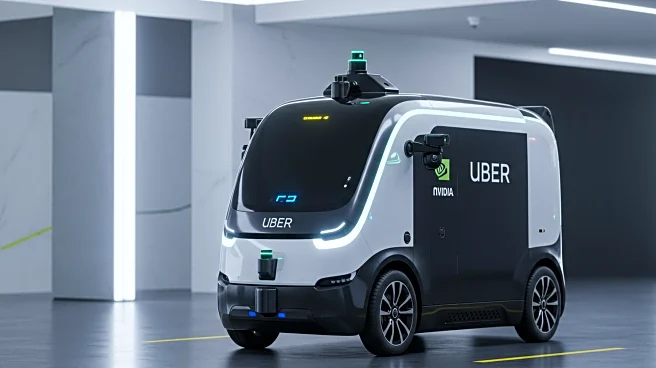What's Happening?
Self-driving vehicle startup Nuro has successfully closed a late-stage funding round, raising $203 million and achieving a valuation of $6 billion. This funding round saw participation from new investors such as Uber and Nvidia, alongside existing backers. The latest tranche of $97 million follows a previous $106 million raised in April, which included investors like T. Rowe Price, Fidelity, and Tiger Global. Despite the current valuation being lower than the $8.6 billion Nuro was valued at in 2021, the company views this as a positive outcome given the broader market conditions. Nuro, founded in 2016, has shifted its focus from delivery robots to licensing its Nuro Driver technology for use in robotaxis, commercial fleets, and personal vehicles. The company has partnered with electric vehicle maker Lucid and Uber to launch a global robotaxi service, with plans for Uber to deploy over 20,000 Lucid Gravity SUVs equipped with Nuro's system across multiple markets starting in 2026.
Why It's Important?
Nuro's successful funding round and strategic partnerships highlight the growing interest and investment in autonomous vehicle technology. The involvement of major players like Uber and Nvidia underscores the potential of self-driving technology to transform transportation and logistics industries. This development could accelerate the deployment of autonomous vehicles, potentially reducing transportation costs and increasing efficiency. However, the reduced valuation compared to 2021 reflects a shift in investor focus towards artificial intelligence and other emerging technologies. The outcome of Nuro's expansion efforts could influence the competitive landscape of the autonomous vehicle market, impacting stakeholders ranging from tech companies to automotive manufacturers.
What's Next?
Nuro's partnership with Uber and Lucid sets the stage for the rollout of a global robotaxi service, with significant deployment planned over the next six years. This initiative could prompt reactions from competitors in the autonomous vehicle space, potentially leading to further collaborations and innovations. Regulatory bodies may also play a crucial role in shaping the future of autonomous transportation, as they establish guidelines and safety standards for widespread adoption. The success of Nuro's expansion could pave the way for similar ventures, influencing public policy and urban planning as cities adapt to new transportation technologies.








